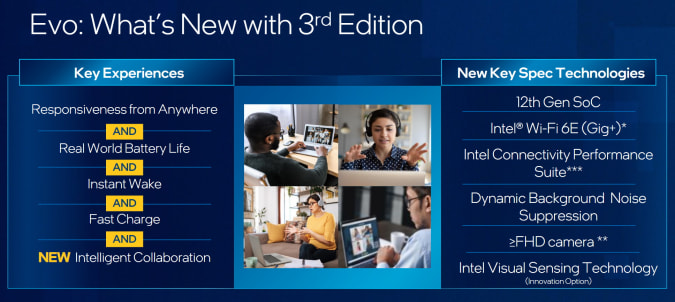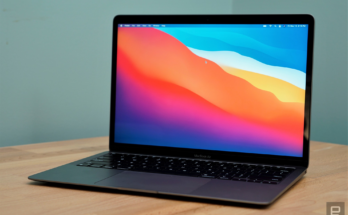Intel hasn’t forgotten about Evo, its premium branding for PCs that meet its array of performance benchmarks. Now in its third iteration (remember it was originally called Project Athena), the company says it’s also adding a foldable specification for Evo PCs this year, along with new requirements around “intelligent collaboration” and support for faster H-series 12th-gen chips. So, in addition to guaranteeing long battery life and instant wake, new Evo PCs will also need to include WiFi 6E support, tap into the company’s AI noise cancellation capabilities as well as Intel’s Connectivity Performance Suite. The goal, as always, is to make sure consumers get the best experience possible when they’re buying an “Intel Evo” branded PC.

Intel
Intel also offered more details around its plans for Screenovate, a recent acquisition that gained notoriety for integrating iPhones and Android devices with Windows PCs. (It also powers Dell’s Mobile Connect tool, which allows you to send files to your phone and control its screen remotely.) According to Josh Newman, Intel’s VP of Mobile Innovation, the company plans to bring Screenovate’s technology to Evo PCs in the 2022 holiday season. The goal, naturally, is to offer it to more PCs eventually, but Newman says Intel wants to ensure that it’s a high quality experience before that. The company plans to work with partners, including Apple, to make that happen.
On stage during its CES presentation, Intel representatives showed Screenovate’s software displaying iPhone text messages on a PC, as well as health data from an Apple Watch. They also demonstrated how an Android tablet could be converted into a secondary display. It didn’t appear to be as seamless as Apple’s SideCar feature, which lets iPads work as screens while connected to Macs, but it’s a start.
While Intel’s specialized Project Athena/Evo PC branding seemed more like a marketing stunt at first, it’s actually pushing PC makers to build better hardware. Newman says that partners are building off of Intel’s foldable PC design, while also adding their own twists. The specification also gives Intel a bit more leverage: for example, it’s requiring partners to design keyboard accessories for their foldables. While Intel can’t force them to include keyboards in the box, company representatives tells us they’re being “encouraged” to do so.
Follow all of the latest news from CES 2022 right here!
All products recommended by Engadget are selected by our editorial team, independent of our parent company. Some of our stories include affiliate links. If you buy something through one of these links, we may earn an affiliate commission.



